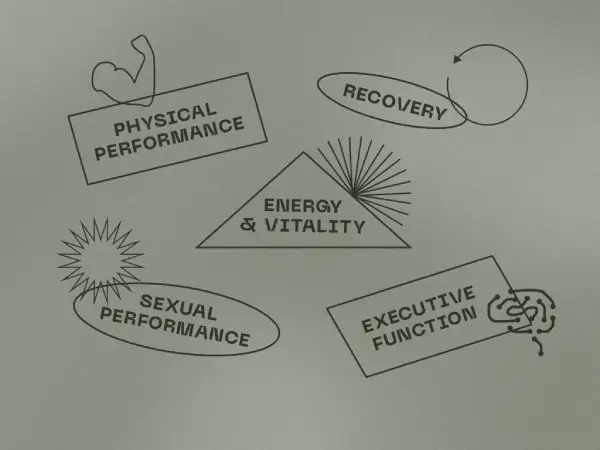Blog
Men’s Wellness Checklist: Top 5 Performance Indicators

According to a 2019 study conducted on 1,174 adult men, 72 percent of them would rather take on house chores than visit their doctor.
We’d laugh if it wasn’t so serious.
Most men finish their immunization in grade school and will hardly see a doctor unless in an emergency. If it ain’t broke, why bother it?
Yet good health isn’t just the absence of disease, but also being proactive about your overall well-being and having a positive approach to life.
Here are five wellness indicators that can help you understand your general health needs.
1. Physical Performance
High-level cardiorespiratory fitness is a great predictor of health and well-being.
Men who want to stay healthy and be around long enough to enjoy their loved ones and the things they have worked for must exercise. Regularly.
Benefits of regular physical movement include:
- Helping you maintain positive mental health—think better mood as well as stress and anxiety management.
- Reducing the risk of colon cancer.
- Lowering the risk of fractures because of thinning bones.
- Keeping off weight which lowers the risk of developing diabetes.
- Reducing inflammation.
- Keeping blood vessels flexible and open, decreasing heart attack risks.
How much exercise is enough?
Dr. Jason Phan suggests moderate physical activity to build your way from 10 minutes → 30-40 minutes of aerobic/cardiovascular exercise. Keeping your heart rate between 140-170 bpm during these workouts will allow you to reap the maximum benefits from this time period you have dedicated to exercise. Depending upon your physical activity level, this should be performed 2-3x week.
For the anaerobic exercises – strength training should be performed 3x weekly. Ideally a PUSH, PULL, & LEG day.
High intensity interval training (HIIT) is suggested because of the weight loss benefits and the muscle building aspects of the training. The training consists of short bursts of exercise done in intervals while maintaining a consistent heart rate. Heart rates can rise up to 200bpm. As the cardiovascular system builds, controlling the heart rate to drop significantly will improve cardiovascular flow within the bloodstream. START SLOW if you are a beginner.
2. Recovery
Mental and physical recovery is important as men age because it takes longer to recover from long nights out, after workouts at the gym, after long cardiovascular exercises, and mental performance at work!
Mental endurance is important for men – to perform at a high level at the office, different sources of revenue or income, investing into the stock market or cryptocurrencies, or investing into real estate. Men are constantly thinking about ways to improve mental performance (clarity, decision making, focus, attention span). The mental/emotional states have been gaining more popularity such as nootropics, mushroom extracts, and even microdosing psilocybin. Another great nootropic is semax peptide or DIHEXA peptides. Peptides are peptide sequences that have specific effects on the body such as increasing growth hormone release from the pituitary gland.
Recovery is a big topic that Dr. Jason Phan may make another blog about to dive into depth. Hormones play a significant role in recovery as well – testosterone and growth hormone. Ways to improve testosterone and growth hormone naturally is 100 push ups in the morning directly upon waking.
LASTLY! NAD+ – Dr. Phan can’t stop raving about this specific nutrient. He notes that he will be getting NAD+ IVs 2-3x/month for the rest of his life. Benefits Dr. Phan has reported from NAD+ use as well as many of his patients include : improved mental endurance, improved energy/mitochondrial function, and cellular recovery – just to name a few.
3. Energy and Vitality
As men age, they experience a slowdown in energy levels and in vitality.
They face age-related problems like joint pain, fatigue, hair loss, wrinkles, and reduced mental, physical and cognitive functions.
Here are ways to turn back the clock and enjoy more energy:
- Eat for vitality. High sugar, high-fat foods are roller coaster foods that give you tons of energy in one minute and leave you feeling lethargic in another—avoid them. Consume whole grains, nuts, high-fiber vegetables, and healthy oils as they release energy slowly, keeping energy levels consistent.
- Optimize nutrient intake by getting a vitamin shot. These vitamin shots are administered through injections that ensure the essential minerals and nutrients reach the bloodstream instantly and provide sustainable energy.
- Pursue an active lifestyle to boost energy levels and reduce the likelihood of sexual dysfunction.
- Manage your stress levels. Moderate stress can help keep you motivated, but continued stress may turn chronic and literally zap the energy out of you.
- Prioritize commitments. Many men bite off more than they can chew, then try to prove that they can handle it. Learn to delegate and say no to some commitments. It will give you space to focus on what truly matters.
- Give up smoking. Smoking presents poor lung function, reduces motivation, and leaves smokers feeling more tired.
- Watch your drinks. Drink plenty of water, lower your alcohol intake, and drink your coffee at appropriate times, ideally in the mornings.
4. Sexual Function & Performance
Right along the vitality lane comes sexual performance.
Energy levels, arousal, and performance are vital to sexual satisfaction. A healthy man can have an erection and enjoy a fulfilling sex life at any age.
Sure, testosterone levels drop as men age and those over 50 years may experience slower erections, but that’s not the end of the road.
With a couple of smart choices, you can boost or maintain your sexual vitality.
Here are some practical things you can do:
- Have more SEX!
- Get your hormone levels checked
- Meditation – 10 minutes daily. Make meditation easy – just get it in.
- Rate your libido or sexual urge from 0-10 and how has it changed over time.
5. Executive Function
Executive function revolves around the skills that help people get things done.
Through executive function, you can focus on tasks, switch focus, follow directions, manage time, control your emotions, and achieve your goals.
When a person’s executive function isn’t working properly, their behavior is less controlled. This may inhibit their ability to work, run things independently, or maintain relationships.
Causes of executive function problems can be inborn or may be brought on by Alzheimer’s disease, dementia, stroke, or injury to the frontal lobe.
Executive function problems can be managed by:
- Making schedules and referring to them several times during the day.
- Investing in time organizing tools like calendars, watches, alarms, and organizers.
- Handling work systematically.
- Creating checklists complete with the estimated time needed to complete each task.
- Using visual aids to promote organization and process information.
- Giving yourself ample time to transition from one activity to another.
Further, identify stress-relieving activities to mitigate stress since stress can negatively impact executive function.

